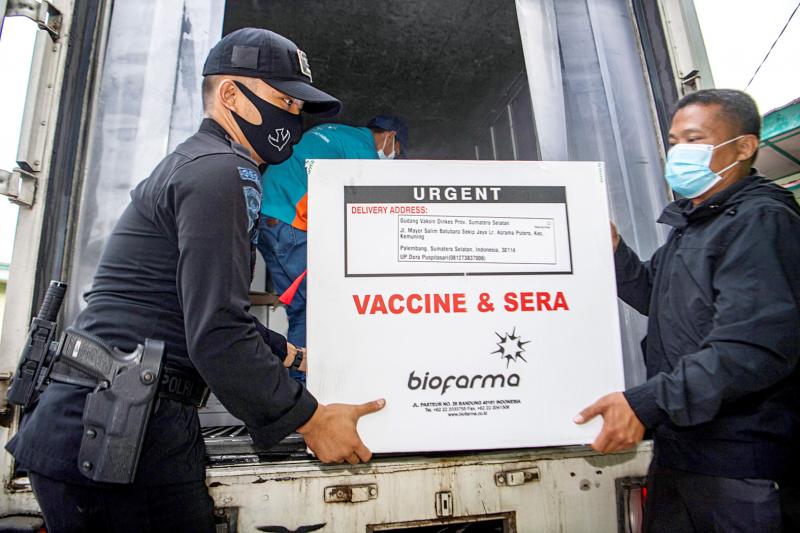As Indonesia prepares to begin mass inoculations against COVID-19, its plan to prioritize working age adults over the elderly, aiming to reach herd immunity fast and revive the economy, will be closely watched by other countries.
Several nations such as the US and the UK that have already begun vaccinations are giving priority to elderly people who are more vulnerable to the respiratory disease.
Indonesia, which plans to begin mass inoculations with a vaccine developed by China’s Sinovac Biotech, says it does not have enough data yet of the vaccine’s efficacy on elderly people, as clinical trials under way in the country involves people aged 18-59.

Photo: Reuters / Antara Foto / Nova Wahyudi
“We’re not bucking the trend,” senior Indonesian Ministry of Health official Siti Nadia Tarmizi said, adding that authorities would await recommendations from the country’s drug regulators to decide on vaccination plans for the elderly.
While the UK and the US began immunizations with a shot developed by Pfizer Inc and its partner BioNTech that showed it works well in people of all ages, Indonesia has initial access only to the Sinovac vaccine.
The Southeast Asian country has a deal to receive 125.5 million doses of Sinovac’s CoronaVac shot, and a first batch of 3 million doses are already in the country.
Shipments of the Pfizer vaccine to the country are expected to begin from the third quarter, while a vaccine developed by AstraZeneca and Oxford University will start being distributed in the second quarter.
“I don’t think anybody can get too dogmatic about what is the right approach,” said Peter Collignon, professor of infectious diseases at Australian National University, adding that Indonesia’s strategy could slow the spread of the disease, although it might not affect mortality rates.
“Indonesia doing it different to the US and Europe is of value, because it will tell us [whether] you’ll see a more dramatic effect in Indonesia than Europe or US because of the strategy they’re doing, but I don’t think anybody knows the answer.”
Dale Fisher, a professor at National University of Singapore’s Yong Loo Lin School of Medicine, said he understood the rationale of Indonesia’s approach.
“Younger working adults are generally more active, more social and travel more so this strategy should decrease community transmission faster than vaccinating older individuals,” he said.
“Of course, older people are more at risk of severe disease and death so vaccinating those has an alternative rationale. I see merit in both strategies,” he said.
By vaccinating more socially mobile and economically active groups first, Indonesian government officials hope the government can quickly reach herd immunity.
Indonesian Minister of Health Budi Gunadi Sadikin said the country needs to vaccinate 181.5 million people, or about 67 percent of its population, to reach herd immunity, and requires almost 427 million doses of vaccines, assuming a double-dose regimen and a 15 percent wastage rate.
Some experts are skeptical about reaching herd immunity, as more research needs to be done to ascertain whether or not vaccinated people can transmit the virus.
“There could be the risk of people still capable of spreading the disease to the others,” Indonesian Health Economic Association head Hasbullah Thabrany said.
Economists have argued a successful vaccination program covering about 100 million people would help jumpstart the economy, as they are more likely to resume economic activity, such as spending and production.
Bank Mandiri economist Faisal Rahman said that the 18-59 age group has consumption needs that are higher than other groups.
“They could jack up the economic recovery faster because household consumption contributes more than 50 percent to Indonesia’s economy,” he said.

Republican US lawmakers on Friday criticized US President Joe Biden’s administration after sanctioned Chinese telecoms equipment giant Huawei unveiled a laptop this week powered by an Intel artificial intelligence (AI) chip. The US placed Huawei on a trade restriction list in 2019 for contravening Iran sanctions, part of a broader effort to hobble Beijing’s technological advances. Placement on the list means the company’s suppliers have to seek a special, difficult-to-obtain license before shipping to it. One such license, issued by then-US president Donald Trump’s administration, has allowed Intel to ship central processors to Huawei for use in laptops since 2020. China hardliners

Conjoined twins Lori and George Schappell, who pursued separate careers, interests and relationships during lives that defied medical expectations, died this month in Pennsylvania, funeral home officials said. They were 62. The twins, listed by Guinness World Records as the oldest living conjoined twins, died on April 7 at the Hospital of the University of Pennsylvania, obituaries posted by Leibensperger Funeral Homes of Hamburg said. The cause of death was not detailed. “When we were born, the doctors didn’t think we’d make 30, but we proved them wrong,” Lori said in an interview when they turned 50, the Philadelphia Inquirer reported. The

RAMPAGE: A Palestinian man was left dead after dozens of Israeli settlers searching for a missing 14-year-old boy stormed a village in the Israeli-occupied West Bank US President Joe Biden on Friday said he expected Iran to attack Israel “sooner, rather than later” and warned Tehran not to proceed. Asked by reporters about his message to Iran, Biden simply said: “Don’t,” underscoring Washington’s commitment to defend Israel. “We are devoted to the defense of Israel. We will support Israel. We will help defend Israel and Iran will not succeed,” he said. Biden said he would not divulge secure information, but said his expectation was that an attack could come “sooner, rather than later.” Israel braced on Friday for an attack by Iran or its proxies as warnings grew of

IN PURSUIT: Israel’s defense minister said the revenge attacks by Israeli settlers would make it difficult for security forces to find those responsible for the 14-year-old’s death Israeli Prime Minister Benjamin Netanyahu on Saturday condemned the “heinous murder” of an Israeli teenager in the occupied West Bank as attacks on Palestinian villages intensified following news of his death. After Benjamin Achimeir, 14, was reported missing near Ramallah on Friday, hundreds of Jewish settlers backed by Israeli forces raided nearby Palestinian villages, torching vehicles and homes, leaving at least one villager dead and dozens wounded. The attacks escalated in several villages on Saturday after Achimeir’s body was found near the Malachi Hashalom outpost. Agence France-Presse correspondents saw smoke rising from burned houses and fields. Mayor Amin Abu Alyah, of the